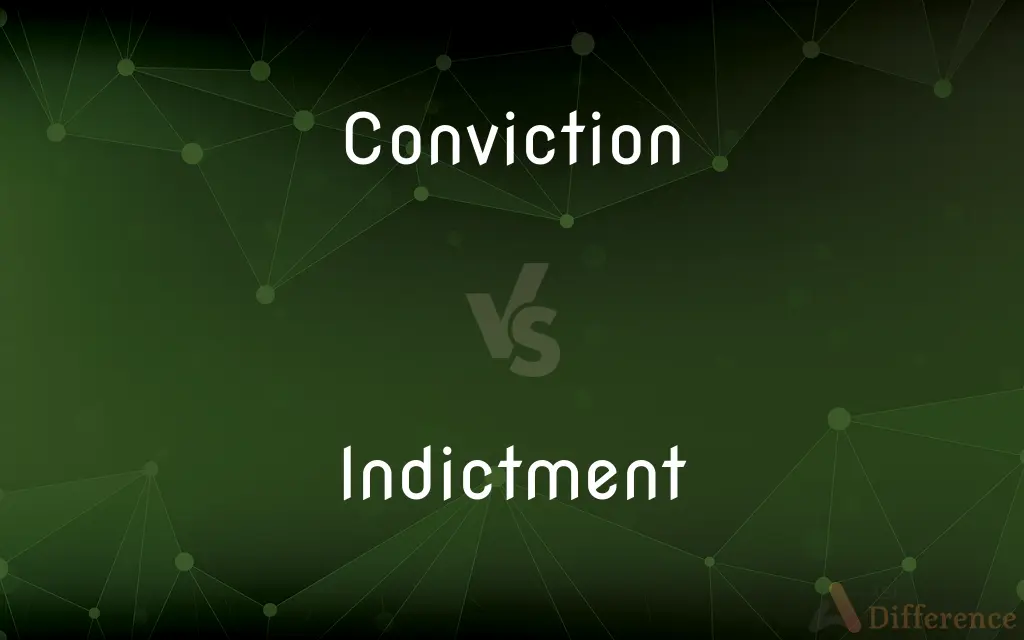Conviction vs. Indictment — What's the Difference?
By Fiza Rafique & Urooj Arif — Updated on March 27, 2024
A conviction is a formal declaration that someone is guilty of a crime following a trial, whereas an indictment is a formal charge or accusation of a serious crime before trial.

Difference Between Conviction and Indictment
Table of Contents
ADVERTISEMENT
Key Differences
Conviction results after a trial process, where the accused is found guilty by a judge or jury based on the evidence presented. It signifies the end of a criminal case with a determination of guilt. On the other hand, an indictment is the beginning of the formal legal process against someone accused of a crime, usually serious or felony charges, following an investigation. It is typically issued by a grand jury in the United States, signaling that there is enough evidence to charge the person with a crime, but not determining guilt.
The process leading to a conviction involves several steps including arraignment, trial, and possibly sentencing, depending on the jurisdiction and the specifics of the criminal case. In contrast, the indictment process involves the collection of evidence by law enforcement and presentation to a grand jury (or a similar preliminary step in jurisdictions outside the US), which decides whether there is sufficient evidence to proceed with a criminal charge.
While a conviction directly impacts the accused, leading to sentencing which may include fines, community service, probation, or imprisonment, an indictment does not determine guilt and, therefore, carries no immediate penalties. However, it may lead to an arrest and/or conditions such as bail while awaiting trial.
The standard of proof for a conviction is "beyond a reasonable doubt," reflecting the high level of certainty required to legally establish someone's guilt. For an indictment, the standard is much lower, often described as "probable cause" or a "reasonable belief" that the person committed the crime, sufficient to justify a trial.
Legally, a conviction can be appealed, typically based on arguments that the trial was somehow flawed or the evidence was insufficient for a guilty verdict. An indictment, while a critical step in the legal process, cannot be appealed in the same way; however, the charges it contains can be challenged or dismissed by a judge prior to or during a trial based on legal arguments or evidentiary issues.
ADVERTISEMENT
Comparison Chart
Definition
Formal declaration of guilt after a trial.
Formal charge or accusation of a serious crime before trial.
Legal Process
Involves trial, evidence evaluation, and sentencing.
Involves investigation and grand jury decision.
Outcome
Determines guilt and leads to sentencing.
Does not determine guilt; leads to trial.
Standard of Proof
Beyond a reasonable doubt.
Probable cause.
Immediate Impact
Sentencing (fines, imprisonment, etc.).
May lead to arrest and/or bail conditions.
Appealability
Convictions can be appealed based on trial flaws.
Charges can be challenged, but the indictment itself is not appealed.
Compare with Definitions
Conviction
Final judgment in a criminal trial.
The jury's decision resulted in the defendant's conviction for theft.
Indictment
Formal accusation initiating a criminal trial.
The grand jury issued an indictment against the suspect.
Conviction
Can result in various sentences.
Her conviction led to a five-year prison sentence.
Indictment
Based on probable cause.
Evidence presented was sufficient for an indictment.
Conviction
Subject to appeals.
The defendant appealed his conviction, seeking a retrial.
Indictment
No immediate penalties, but may lead to trial.
Following the indictment, he was released on bail.
Conviction
Marks the end of the criminal process.
The conviction concluded the lengthy court proceedings.
Indictment
Charges can be dismissed or challenged.
His lawyer sought to have the indictment charges dismissed.
Conviction
Requires evidence proving guilt beyond a reasonable doubt.
The overwhelming evidence led to his conviction.
Indictment
First step in holding someone accountable for a serious crime.
The indictment marked the beginning of legal action.
Conviction
In law, a conviction is the verdict that usually results when a court of law finds a defendant guilty of a crime. The opposite of a conviction is an acquittal (that is, "not guilty").
Indictment
An indictment ( in-DYT-mənt) is a criminal accusation that a person has committed a crime. In jurisdictions that use the concept of felonies, the most serious criminal offence is a felony; jurisdictions that do not use the felonies concept often use that of an indictable offence, an offence that requires an indictment.
Conviction
The judgment of a jury or judge that a person is guilty of a crime as charged.
Indictment
A set of written criminal charges issued against a party, where a grand jury, under the guidance of a prosecutor, has found that sufficient evidence exists to justify trying the party for that crime.
Conviction
The state of being found or proved guilty
Evidence that led to the suspect's conviction.
Indictment
The act or process of obtaining such charges.
Conviction
The act or process of convincing.
Indictment
A document or other communication that makes accusations of wrongdoing or describes an unacceptable situation
"[the book, an] exhaustively researched indictment of the fast-food industry" (Suzanne Schlosberg).
Conviction
The state or appearance of being convinced
She spoke with real conviction on the matter.
Indictment
(legal) An official formal accusation for a criminal offence, or the process by which it is brought to a jury.
Conviction
A fixed or strong belief.
Indictment
(legal) The official legal document outlining the charges concerned; bill of indictment.
Conviction
(countable) A firmly held belief.
Indictment
An accusation of wrongdoing; a criticism or condemnation.
Conviction
(countable) A judgement of guilt in a court of law.
Indictment
Evidence of failure or poor performance.
An indictment of his ability to lead
An indictment of his game
Conviction
(uncountable) The state of being found or proved guilty.
Indictment
The act of indicting, or the state of being indicted.
Conviction
(uncountable) The state of being wholly convinced.
Indictment
The formal statement of an offense, as framed by the prosecuting authority of the State, and found by the grand jury.
Conviction
The act of convicting; the act of proving, finding, or adjudging, guilty of an offense.
The greater certainty of conviction and the greater certainty of punishment.
Indictment
An accusation in general; a formal accusation.
Conviction
A judgment of condemnation entered by a court having jurisdiction; the act or process of finding guilty, or the state of being found guilty of any crime by a legal tribunal.
Conviction may accrue two ways.
Indictment
A formal document written for a prosecuting attorney charging a person with some offense
Conviction
The act of convincing of error, or of compelling the admission of a truth; confutation.
For all his tedious talk is but vain boast,Or subtle shifts conviction to evade.
Indictment
An accusation of wrongdoing;
The book is an indictment of modern philosophy
Conviction
The state of being convinced or convicted; strong persuasion or belief; especially, the state of being convicted of sin, or by one's conscience.
To call good evil, and evil good, against the conviction of their own consciences.
And did you presently fall under the power of this conviction?
Conviction
An unshakable belief in something without need for proof or evidence
Conviction
(criminal law) a final judgment of guilty in a criminal case and the punishment that is imposed;
The conviction came as no surprise
Common Curiosities
What is a conviction?
A legal declaration that someone is guilty of a crime after a trial.
Can you be sentenced after an indictment?
No, sentencing can only occur after a conviction.
What happens between an indictment and a conviction?
The accused goes through a trial process where evidence is presented and evaluated to determine guilt.
Is a conviction the same as being charged?
No, a conviction follows a guilty verdict at trial, while being charged occurs at the indictment stage.
Who decides on a conviction?
A judge or jury, depending on the legal system and specific circumstances of the case.
What does an indictment mean?
A formal accusation that someone is believed to have committed a serious crime, leading to a trial.
Does an indictment mean you will go to jail?
Not necessarily; jail or prison sentences are only determined after a conviction.
Can you appeal an indictment?
Directly appealing an indictment is not possible, but the charges it contains can be legally challenged.
How long does it take from indictment to conviction?
The timeline varies widely depending on the complexity of the case and the legal system.
How serious is an indictment?
An indictment is serious as it involves formal charges for serious crimes and initiates a criminal trial.
Are all criminal cases indicted?
Not all; minor crimes might proceed through a different process, such as a criminal complaint or summons.
Can a conviction be overturned?
Yes, through appeals based on issues like new evidence or legal errors during the trial.
What leads to a conviction?
A conviction results from a trial where the accused is found guilty beyond a reasonable doubt.
What evidence is needed for an indictment?
Enough evidence to show probable cause that the accused committed the crime.
What rights do you have after an indictment?
Rights include legal representation, a fair trial, and the presumption of innocence until proven guilty.
Share Your Discovery

Previous Comparison
Gravy vs. Poutine
Next Comparison
Ranch vs. RanchetteAuthor Spotlight
Written by
Fiza RafiqueFiza Rafique is a skilled content writer at AskDifference.com, where she meticulously refines and enhances written pieces. Drawing from her vast editorial expertise, Fiza ensures clarity, accuracy, and precision in every article. Passionate about language, she continually seeks to elevate the quality of content for readers worldwide.
Co-written by
Urooj ArifUrooj is a skilled content writer at Ask Difference, known for her exceptional ability to simplify complex topics into engaging and informative content. With a passion for research and a flair for clear, concise writing, she consistently delivers articles that resonate with our diverse audience.
















































